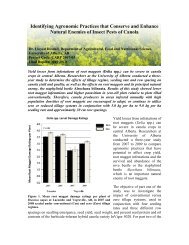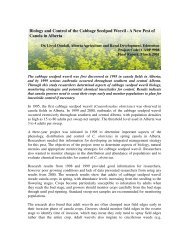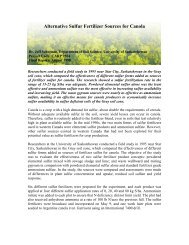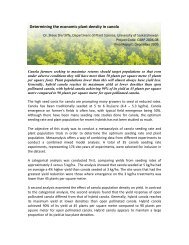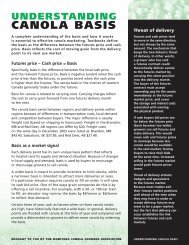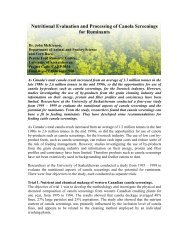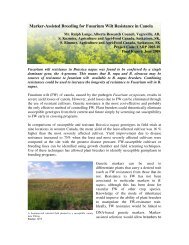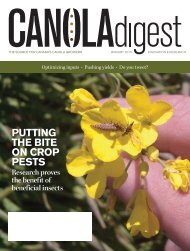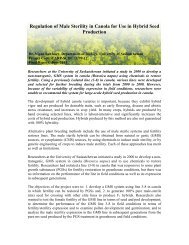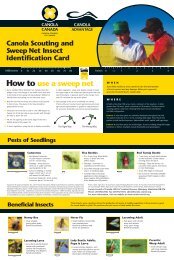Food Studies 30 - SaskCanola
Food Studies 30 - SaskCanola
Food Studies 30 - SaskCanola
- No tags were found...
Create successful ePaper yourself
Turn your PDF publications into a flip-book with our unique Google optimized e-Paper software.
The<strong>SaskCanola</strong> Postwww.saskcanola.com CANOLA OIL. GOOD FOR EVERY BODY! Since 19918Nutrients, Nutrients,NutrientsBy Ellen Hinz of The <strong>SaskCanola</strong> PostA nutrient is a chemical that an organism needs tolive and grow or a substance used in an organism’smetabolism which must be taken in from its environment.Nutrients are the substances that enrich the body.Nutrients build and repair tissues, give heat and energy,and regulate body processes.Organic nutrients include carbohydrates, fats, proteins,vitamins, and minerals. A nutrient is essential to anorganism if it cannot be synthesized by the organismin sufficient quantities and must be obtained from anexternal source. Nutrients needed in large quantities arecalled macronutrients; nutrients needed in small quantitiesare called micronutrients.Micronutrients and macronutrients from food areabsorbed by the body as it passes through the digestivesystem. Although nutrients can work alone, each dependsupon the others to be the most effective.Let’s talk vitamins and minerals! Vitamins are organicchemicals that a living organism requires in smallquantities for good health. Vitamins and minerals do notprovide energy on their own, but macronutrients dependon vitamins and minerals to regulate the release of energyfrom food.Let’s talk carbohydrates! Carbohydrates provide energyfor the body. Carbohydrates also protect your musclesand help regulate the amount of sugar circulating in yourblood so that all the cells get the energy they need.An average healthy adult needs 200-250 grams ofcarbohydrates per day. Carbohydrates come in twoforms: simple and complex. Both are composed of unitsof sugar. The difference is how many sugar units theycontain, and how they link together. Simple carbohydratesare sugars that give you instant energy and typicallyhave no nutritional value. These include sweets, candy,and soda. Complex carbohydrates release energyslowly and often contain fiber. These “healthier” formsof carbohydrates include bread, pasta, rice, potatoes,cereals, and legumes.Most Canadians do not get enough fiber in their diet.Choosing whole grain options like brown rice or wholewheat pasta, increases fiber intake.Let’s talk protein! Protein is used by the body to buildnew cells, maintain muscle, and regulate cell function.About half of the protein consumed daily is convertedinto enzymes. Enzymes work in the body to regulate thespeed of biological reactions, permit it to digest food,and assemble or divide molecules to make new cellsand chemical substances. To perform these functions,enzymes often need specific vitamins and minerals.Twenty two different amino acids are required to make allthe proteins that the body needs. Nine are essential andare not synthesized by the body so they must be obtainedfrom food. Our bodies can produce the other thirteennon-essential amino acids from fats, carbohydrates, andamino acids.An average healthy adult needs 50-75 grams of proteinper day. Good sources of protein can be found in meat,poultry, fish, eggs, cheese, nuts, legumes, and soy.Let’s talk fats! Fats aid in energy production, cellbuilding, oxygen transport, blood clotting, and theproduction of extremely active hormone-like substancescalled prostaglandins.Fats can be saturated, polyunsaturated, andmonounsaturated. Monounsaturated and saturated fatscan be produced by our bodies. Polyunsaturated fats, oressential fatty acids, cannot be synthesized by the bodyso they must be obtained from our diet.An average healthy adult needs 40-70 grams offat per day, with most fats coming from sources ofpolyunsaturated and monounsaturated fatty acids,such as fish, nuts, and vegetable oils. All vegetableoils and animal fats are a mixture of unsaturated andsaturated fats; it is the amounts of monounsaturated,polyunsaturated, and saturated that determine which arehealthier oils. The more unsaturated, the more healthythe oil. Canola oil and olive oil are good sources ofmonounsaturated fats.The advantage of eating specific nutrient rich foods isthat the body can readily absorb and utilize the contentswithout having to remanufacture or convert refinedingredients. The less work the body has to do to nourishitself, the better!BLM 5



